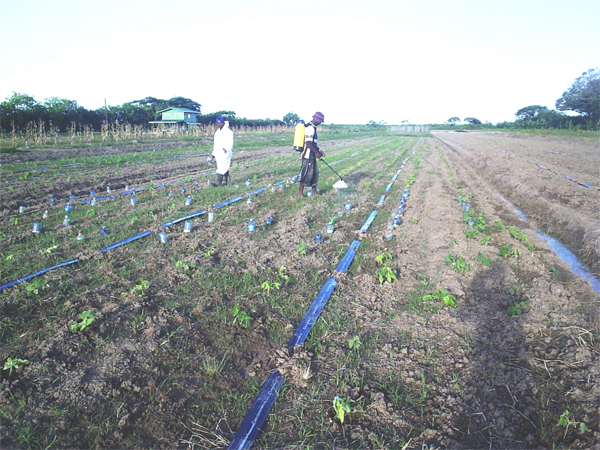With the model farm joint venture between Neal and Massy’s (NM) Geddes Grant division and the Government serving as a “hub”, the eventual participation of other private sector investors in the Mon Repos project is envisaged.
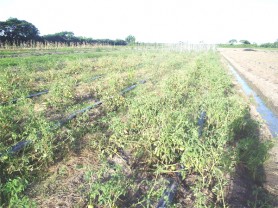
“It is the Neal and Massy Group’s contribution towards the government’s Grow More campaign and also in developing farmers to grow more. So the farm is meant to be a demonstration plot, at the end of the day we will have this farm, which other farmers can come and look at”, said Seu Sarran Prasad, the Chief Executive Officer (CEO) of Geddes Grant.
President Bharrat Jagdeo, who is the lead head of Government for Agriculture in Caricom has persistently urged the private sector to pay greater interest in the agricultural sector and in November last year, the conglomerate and the Agriculture Ministry held a commemoration ceremony for a modern demonstration farm and training facility at Mon Repos. It was reported at the time that NM donated $13M to the project, which is expected to be fully completed within the next five years.
In an interview with Stabroek News on Thursday, Prasad, noting that the company is in the
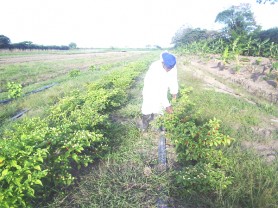
first year of developing the 10-acre farm, said that some of the necessary infrastructure has already been put in place. Operations began last October, and Prasad said that this involved converting the virgin land, putting in the necessary drainage and irrigation infrastructure, creating the beds and testing the soil. The Government had made the land available and is also providing technical assistance through the National Agricultural Research Institute (NARI). The Institute can utilize the facility to train farmers to be better able to develop their crops.
The overall objectives, according to Prasad, are to make the farm viable so that at the end of the day, it must provide a positive cash return and also to select crops that either have the potential to be sold on the export market or can be substituted for imports. He explained that farmers are already providing an adequate supply of vegetables such as bora and boulanger, and they would not want to venture into these crops but crops such as turmeric, which is used in the curry powder manufacturing process here and a lot of which is imported, in the import substitution scenario, they would grow it locally and sell to the manufacturers. The CEO noted that they are still in the process of selecting crops, which can best fulfill these requirements but are looking particularly at certain varieties of hot pepper and ginger.

Nestled within an enclave of agricultural facilities at Mon Repos, the farm is well laid out and several crops such as pepper, corn, tomatoes, bananas, among others are currently being grown. Drainage and irrigation systems have been set up. Pipes and hoses carry water to the plants in an efficient manner. A farmhouse has been constructed.
Prasad disclosed that soil tests have been done to determine nutrient deficiencies and they are replenishing these so that it can accommodate the crops. The company is partnering closely with NARI. “We are now testing the soil, the response of several crops that we are now growing there. These are basically on a test scenario to see which crops would fare best given the soil and other conditions in this area”, he disclosed adding that hopefully, after the first year, they would be able to select which crops to grow on a larger scale.
Chairman of the Agriculture sub-committee of the Private Sector Commission (PSC), Beni
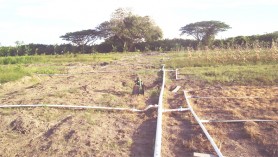
Sankar had recently told the Stabroek Business that a business plan for the creation of a major multi-stakeholder private sector investment in the country’s agricultural sector could be completed within a few days and critical decisions with regard to moving ahead with the investment are likely to be made over the next month. He had said that this revolves around an envisaged joint venture partnership between NM and around twenty private sector companies including some major players in the business community.
Prasad said that if the possibilities are great from an economic standpoint, and the farm can be a model for (cultivation) on an expanded basis, it could be the incubation for an enlarged concept to take place. He noted that if it is enlarged, it becomes more viable. There is a role for the private sector to play, he emphasized and NM is looking at enlarging the concept.
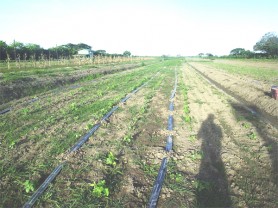
Meantime, after the crops to be cultivated are identified and they are viable, the “desirable next step” would be commercialization of the farm. This, the CEO said, would entail expanding the acreage under cultivation and would involve taking up 30 to 40 acres of land to bring the total area under cultivation to about 50 acres. He reiterated that the company welcomes the initiative by the PSC and wants private sector companies to join with NM in the initiative as the venture needs wider private sector participation. Prasad posited that the farm could be the “hub” around which expanded development could take place. He disclosed that the PSC has already indicated an interest in having its membership contribute resources towards expanding the model concept into a farm noting that once this happens, the economic viability will certainly be enhanced.
The infrastructure around which the expansion can occur, has already been put in place, he noted pointing to the drainage structures, farmhouse and bridge.
“Members of the private sector can contribute additional capital resources which will be required in order to provide an expansion in the concept thereby enhancing the economic viability”, he stated, noting that there are lands at Mon Repos available for expansion. Prasad had said earlier that at the end of the day, the farm would revert back to the government so that they could engage in the kind of activities on a national level that would benefit other farmers from seeing what has gone on there. He later noted that once there is commercial production, it would be managed by the Company.
Meantime, he noted, the farm is all about best practices. “I think it is being done with a view
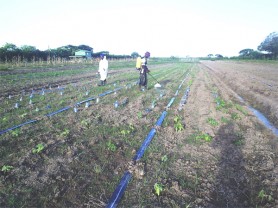
toward enhancing farmers knowledge of what good practices in farming ought to be and how you could go about doing it in a very structured and logical way”, he stated. Prasad said that the facility does not encompass many technological or scientific practices and the focus is on bringing out the basic things that must be in place for a farm, such as a layout and structure that makes sense and good drainage and irrigation. In this light, he pointed to the pipes and pumps that are used to bring water to the crops in an efficient manner. He noted that it is important to continue to test the soil to see whether nutrients are up to required level.
For those looking to join in the venture, the tests results would be available. “We didn’t do it by guess, we went, we tested the soil, we took soil samples, we sent those samples overseas to be tested and we got a report”, he stated. NM is funding the development of the project. He emphasized that the government is also putting up resources, though more on the technical side through NARI. “Certainly we have made the contributions which has allowed the project to develop the way it has but I want to stress that could not have been done without the provision of technical services that have been rendered by the Ministry of Agriculture and also NARI”, he asserted. He noted that Minister of Agriculture Robert Persaud has been very supportive of the project.
Guyana’s potential in agriculture is great because “we already know how to do agriculture and do it well”, the CEO said. He noted that sugar and rice are well entrenched. “Where we need to go is to that third stage or third leg which is the other-type crops and what kinds of potential exist for export. That’s where we are trying to move this project”, he stated. He declared that there are opportunities in this crop segment. “Neal and Massy would want to remain engaged in this process and we would like to see the process enlarged whereby other private sector companies join this effort and we certainly will remain part of that effort”, he asserting reiterating that the project is in its very early stages.

